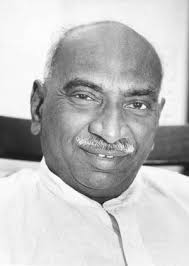Kumarasami Kamaraj (Tamil: குமாரசாமி காமராஜ்) better known as K. Kamaraj (15 July 1903 – 2 October 1975) was an Indian politician from Tamil Nadu widely acknowledged as the "Kingmaker" in Indian politics during the 1960s. He was the chief minister of Tamil Nadu during 1954-1963 and a Member of Parliament during 1952-1954 and 1969-1975. He was known for his simplicity and integrity.
He was involved in the Indian independence movement. As a high ranking office bearer of the Indian National Congress, he was instrumental in bringing to power two Prime Ministers, Lal Bahadur Shastri in 1964 and Indira Gandhi in 1966. In Tamil Nadu, his home state, he is still remembered for bringing school education to millions of the rural poor by introducing free education and the free Mid-day Meal Scheme during his tenure as chief minister. He was awarded India's highest civilian honour, the Bharat Ratna, posthumously in 1976. The domestic terminal of the Chennai airport is named "Kamaraj Terminal" in his honour and the Madurai Kamaraj University has been renamed after him


He was involved in the Indian independence movement. As a high ranking office bearer of the Indian National Congress, he was instrumental in bringing to power two Prime Ministers, Lal Bahadur Shastri in 1964 and Indira Gandhi in 1966. In Tamil Nadu, his home state, he is still remembered for bringing school education to millions of the rural poor by introducing free education and the free Mid-day Meal Scheme during his tenure as chief minister. He was awarded India's highest civilian honour, the Bharat Ratna, posthumously in 1976. The domestic terminal of the Chennai airport is named "Kamaraj Terminal" in his honour and the Madurai Kamaraj University has been renamed after him
| K. Kamaraj | |
 | |
Member of Parliament (Lok Sabha) for Nagercoil | |
| In office 1967–1975 | |
| Preceded by | A. Nesamony |
|---|---|
| Succeeded by | Kumari Ananthan |
| Constituency | Nagercoil |
Member of Tamil Nadu Legislative Assembly for Sattur | |
| In office 1957–1967 | |
| Preceded by | S. Ramaswamy Naidu |
|---|---|
| Succeeded by | S. Ramaswamy Naidu |
| Constituency | Sattur |
Member of Tamil Nadu Legislative Assembly for Gudiyatham | |
| In office 1954–1957 | |
| Preceded by | Rathnaswamy and A. J. Arunachala Mudaliar |
| Succeeded by | V. K. Kothandaraman and T. Manavalan |
| Constituency | Gudiyatham |
Chief Minister of the Madras State (Tamil Nadu) | |
| In office 1954–1963 | |
| Preceded by | C. Rajagopalachari |
| Succeeded by | M. Bhakthavatsalam |
Member of Parliament (Lok Sabha) for Srivilliputhur | |
| In office 1952–1954 | |
| Preceded by | None |
| Succeeded by | S. S. Natarajan |
| Constituency | Srivilliputhur |
President of the Indian National Congress (Organisation) | |
| In office 1967–1971 | |
| Preceded by | None |
| Succeeded by | Morarji Desai |
President of the Indian National Congress | |
| In office 1963–1967 | |
| Preceded by | Neelam Sanjiva Reddy |
| Succeeded by | S. Nijalingappa |
President of the Madras Provincial Congress Committee | |
| In office 1946–1952 | |
| Succeeded by | P. Subbarayan |
| Born | 15 July 1903 Virudhunagar, Tamil Nadu, India |
| Died | 2 October 1975 Chennai , Tamil Nadu, India |
| Nationality | Indian |
| Spouse(s) | NIL |
| Children | NIL |
| Religion | Hindu |
| Signature | |






 Click to play video
Click to play video